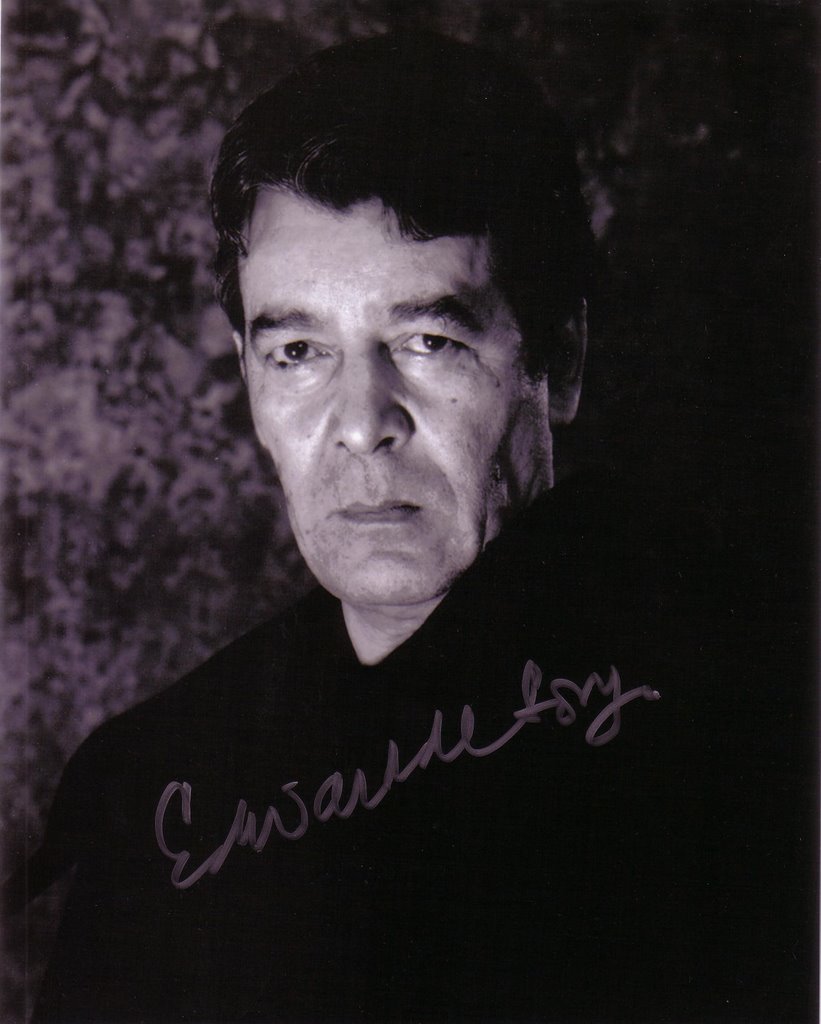Welcome to Radio Free Magamund, wherein I listen to stuff then write about it. Here we are listening to the audiobook of the novel of the gamebook adaptation of Lone Wolf Legends: Eclipse of the Kai, by Joe Dever and John Grant, read by Edward DeSouza.
Part 1: A Magician Spurned or "I Allied Myself with the Kitten"
The story opens with Vonotar debating magic and morality with the head of the Brotherhood of the Crystal Star, DeSouza voices him with an snarky arrogant sneer, whereas the Guildmaster is given something of a airy, slow, pedantic drone - perfectly capturing his infuriating, pompous holier-than-thou attitude, I imagine DeSouza doing Saruman would have been great. Right from the start, the character voices are delineated very well, clearly and DeSouza seems to be enjoying the roles, especially Vonotar get the sense he likes to play the villain.
| Vonotar - Gary Chalk |
During their debate, much is made of the Left Hand Path (good) and Right Hand Path (evil) schools of magic, probaby inhereted from Tantric traditions, but strangely inverted. Dakshinachara (Right Handed / Orthodox) and Vāmācāra (Left Handed / Heterodox). It's often quite suprising how much real-world magical terms creep into UK gaming literature - off the top of my head, the neopagan flavoured Wood Elves from Games Workshop and the Treasure Trap's >mana< system. Here the terms seem to be almost exactly more along the lines of of OD&D Alignments (a system of narrative motivational consistency for roleplaying, or perhaps part of D&Ds cryptosatanic training methods [j/k]) Lawful and Chaotic than any direct influence of contemporary New Age or hindu mystical traditions.
| HAMSA| Left Hand Path | Disturbia or well, Right hHnd Path if you're from Magnamund |
Vonotar's Chaotic Evilness is clear from the start, his sneering, his lust for power, seeks change, a disruption of the old order and repalcing it with the new - which is necisserilly evil. And we see him move very swiftly from 'The Right Hand Path can be used for good' to murdering a kitten called Grey One (don't worry, he's resurrected) - which gives the first unintentional piece of comedy when Vonotar, trying to prove his Lawful Goodness spits out in furious tones "I allied myself with the kitten!" But it's not long that he's packing his bags to go in search of darker magicks, which leads him to murdering an aged wizard whose a bit interested in all this Right Handedness. By now there is absolutely no doubting the direction of Vonotars moral compass as he runs off to the Darklands to join with the Darklords and learn the true power of the Right Hand Path and take over the world.
 |
| Lone Wolf: Last of the Kai | Gary Chalk |
Meanwhile... we are treated to some foundational episodes in in Landors childood (Landor being the pre-Kai name of Silent Wolf ), suffering tradgedy and becoming a Kai Initiate which gives him his rather grim demeanor. The Kai are can order of Rangers - warriors with magical talents, and again, like the Brotherhood of the Crystal Star - a class-based order suitable for training. Somehow the D&Dness of the Lone Wolf seems more apparent in the listening than the playing, perhaps the contraction and juxtaposition of the charatcers makes comparison easier.
Silent Wolf is being punished for falling asleep in class. Somewhat contradictory, we're told that he studies books while other children play, and more interested in physical combat skills than book-learning. His time at the monastery is something he has to just put up with rather than engage with. This seems to mirroring the school life of a remedial reader: lack of academic achievement, having to stay in and read (forced 'to catch up' - whilst Silent Wolf does this through choice), not really being interested and being punished for not paying attention. Not that I have personal experience, but know people who do. This could be a strategy to create empathy with the protagonist - fantasy novels and game-books in particular seem to be perennial favourites on those lists of getting boys to read, so giving Silent Wolf. He also doesn't say much, which is another technique in building a narrative character as a useful avatar - dialogue being one of the most common mood-breakers in gamebooks.
| Screenshot of the ZX Spectum version of Flight From the Dark Audiobook of the Novel of the Gamebook |
For his ability to fight, Silent Wolf is instructed to accompany Kai Master Storm Hawk on a reconnaissance mission to the edge of the Darklands to substantiate rumours of gathering bands of Giaks. These reports are confirmed, but on their return they encounter Vonotar, who proceeds to kill Storm Hawk, using Right Hand magic. Silent Wolf heads back to the monastery bearing the grim news... it all moves along ant quite a pace.
We are also introduced to some kind of puckish female cosmic superbeing who isn't named at this point. I don't recall this from the gamebook. She causes an eclipse by clicking her fingers, "but not a very good eclipse, because she's not a very good person". The throwaway 'good person' judgement curiously out of place with the rather heavy wrought delineation of the morality of the different magic schools, and the down-to-earth human concerns and motivations of the other characters - it all doesn't seem quite to fit somehow, we'll see how this pans out.
So ends Side 1.
Being familiar with the original much of the story quite nicely foreshadows the events of Flight from the Dark, quite tempted to pull it off the shelf for a comparison. After the initial establishment of the moral universe, the focus swiftly moves on to action - we don't get long Thomas Hardyesque descriptions of the Magnamund countryside, and developing character.


